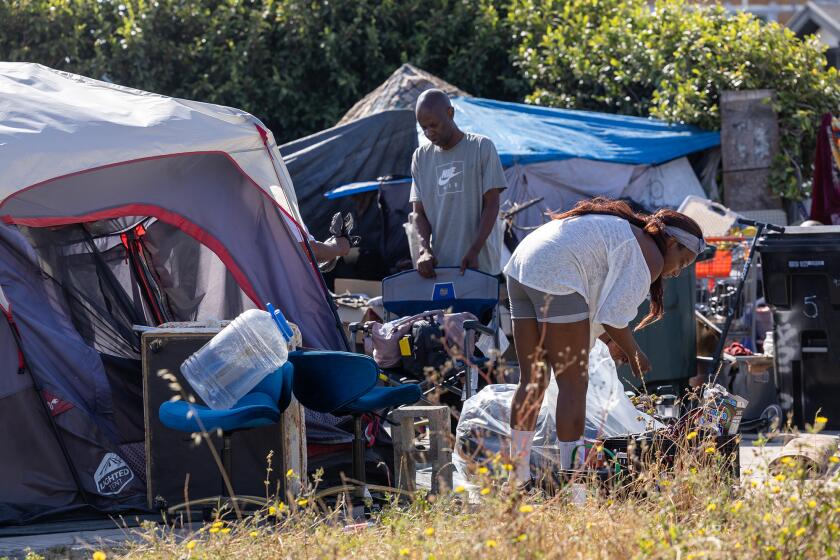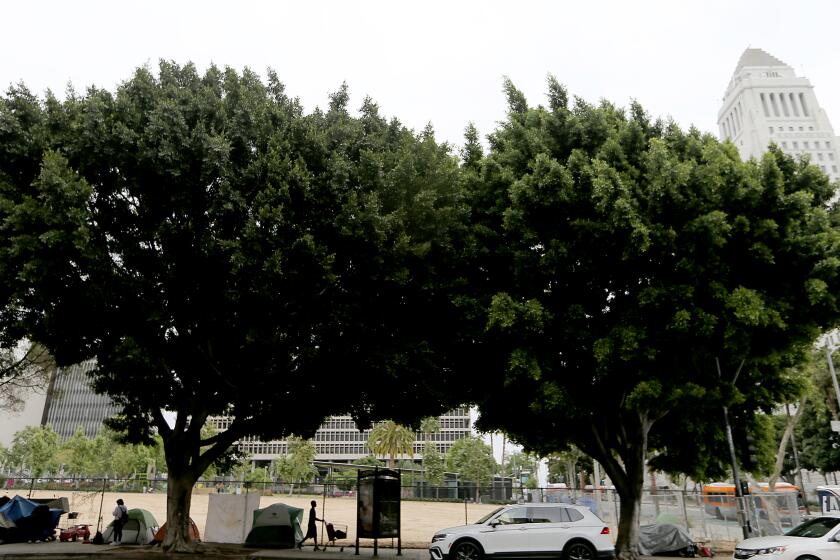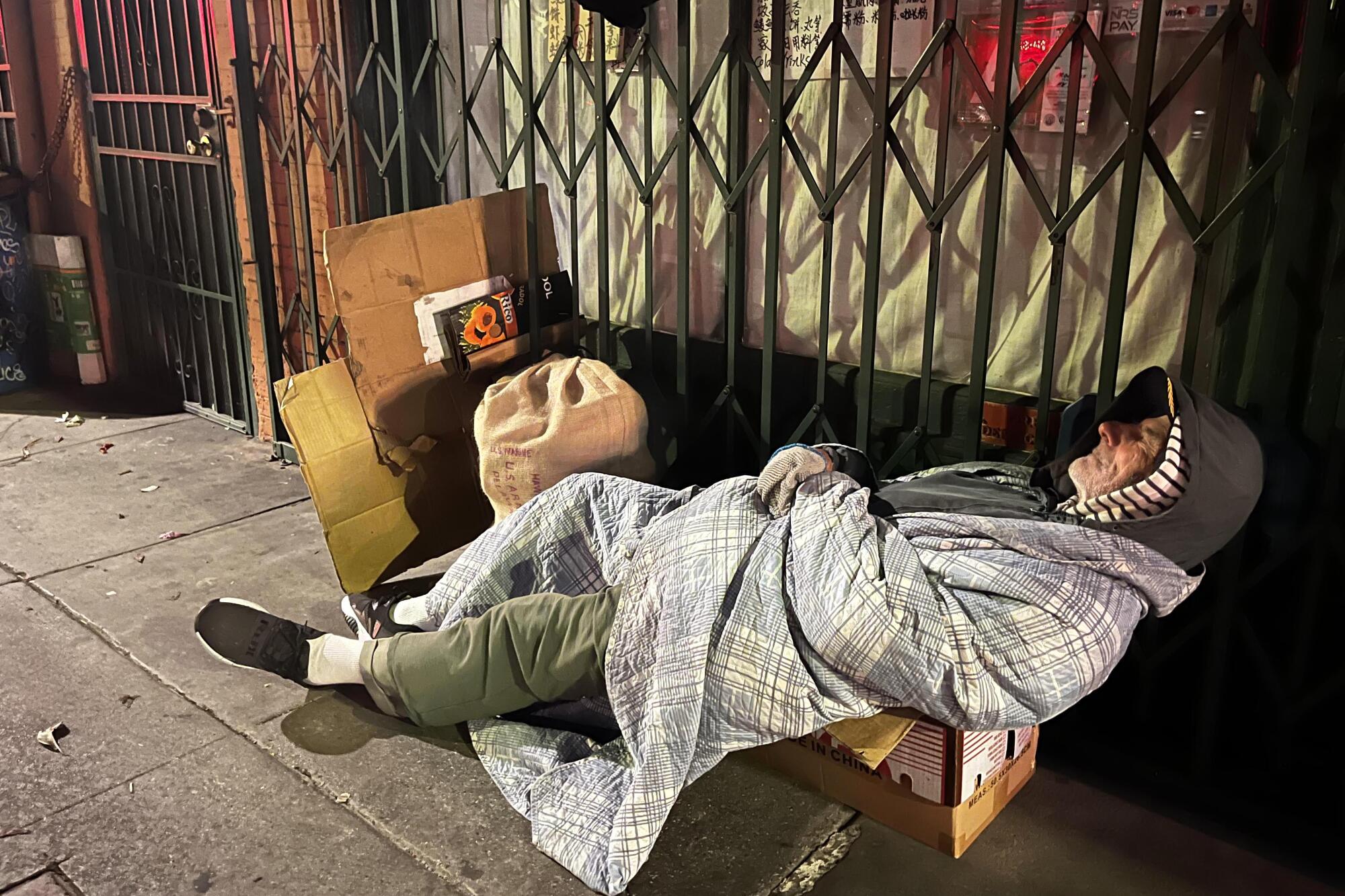
- Share via
When the U.S. Supreme Court issued its landmark ruling on anti-camping laws last month, Pasadena Mayor Victor Gordo was one of the local political leaders who welcomed it.
The high court concluded that laws penalizing homeless people for sleeping or pitching tents in public spaces do not constitute cruel and unusual punishment. That means cities can clear homeless encampments from parks, sidewalks and other areas even when they lack sufficient shelter beds.
Gordo said his city intends to toughen enforcement, but in a compassionate way — by offering shelter and other services while also regulating its parks and sidewalks.
“Individuals will be offered the assistance they need,” he said. “But we cannot allow people to simply take over public spaces and parks while they refuse the assistance that is being offered.”
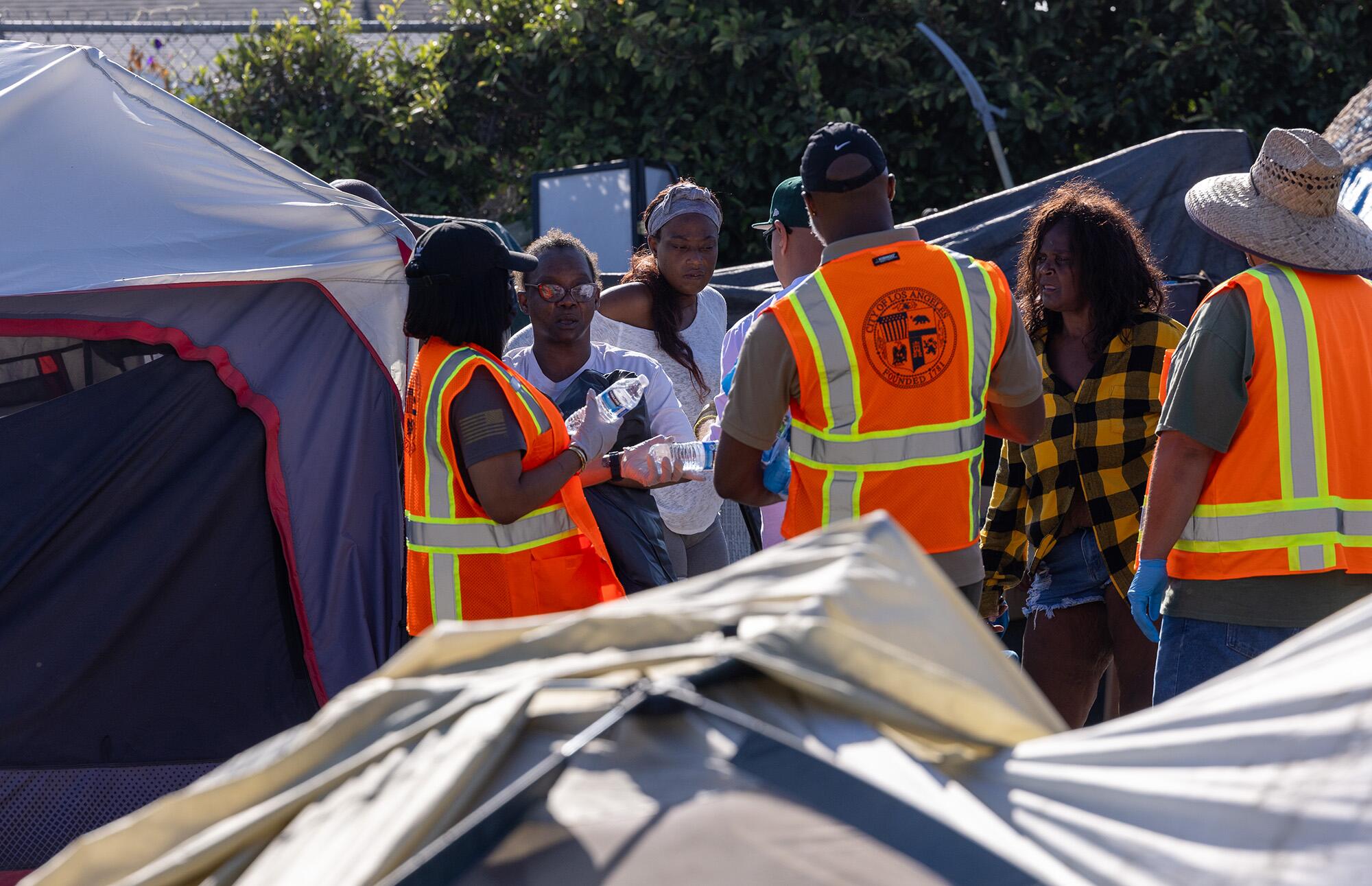
Gordo said the ruling gives his city renewed flexibility to respond to the crisis and “takes away the excuse that we’re prevented from doing it. Now the responsibility is on all of us to take action. In Pasadena, that’s what we intend to do.”
In Eagle Rock, a neighborhood of Los Angeles that borders Pasadena, City Councilmember Kevin de León sounded less enthusiastic about the court decision. De León said he fears the ruling will spur the smaller cities that abut his Eastside district to force their homeless populations out.
“If you’re an unhoused person, and you’re feeling harassed constantly, you’re just going to self-evict and relocate to the city limits of L.A.,” he said.
The 2024 homeless count found the number of people living on Los Angeles city and county streets declined after five years of increases.
Political leaders across Southern California have offered an array of reactions to the Supreme Court ruling, with some voicing relief and others sounding anxious.
Some have expressed gratitude that the justices clarified the legal standard for enforcement, which they say had been muddled by lower court rulings. Others are openly worried that neighboring cities will take a punitive approach, sending police to encampments to hand out citations while failing to build sufficient shelter and permanent housing.
The issue is particularly sensitive in L.A., where enforcement of the city’s anti-camping law varies widely from neighborhood to neighborhood. That law, known as 41.18, targets key locations, such as schools and day-care centers, and is not a citywide ban.
Several city leaders pointed to a recently released video that showed Burbank police leaving a homeless man with no shoes on the sidewalk outside the North Hollywood office of L.A. Council President Paul Krekorian. The video, which captured the man as he crumpled to the pavement, drew demands for a criminal investigation.
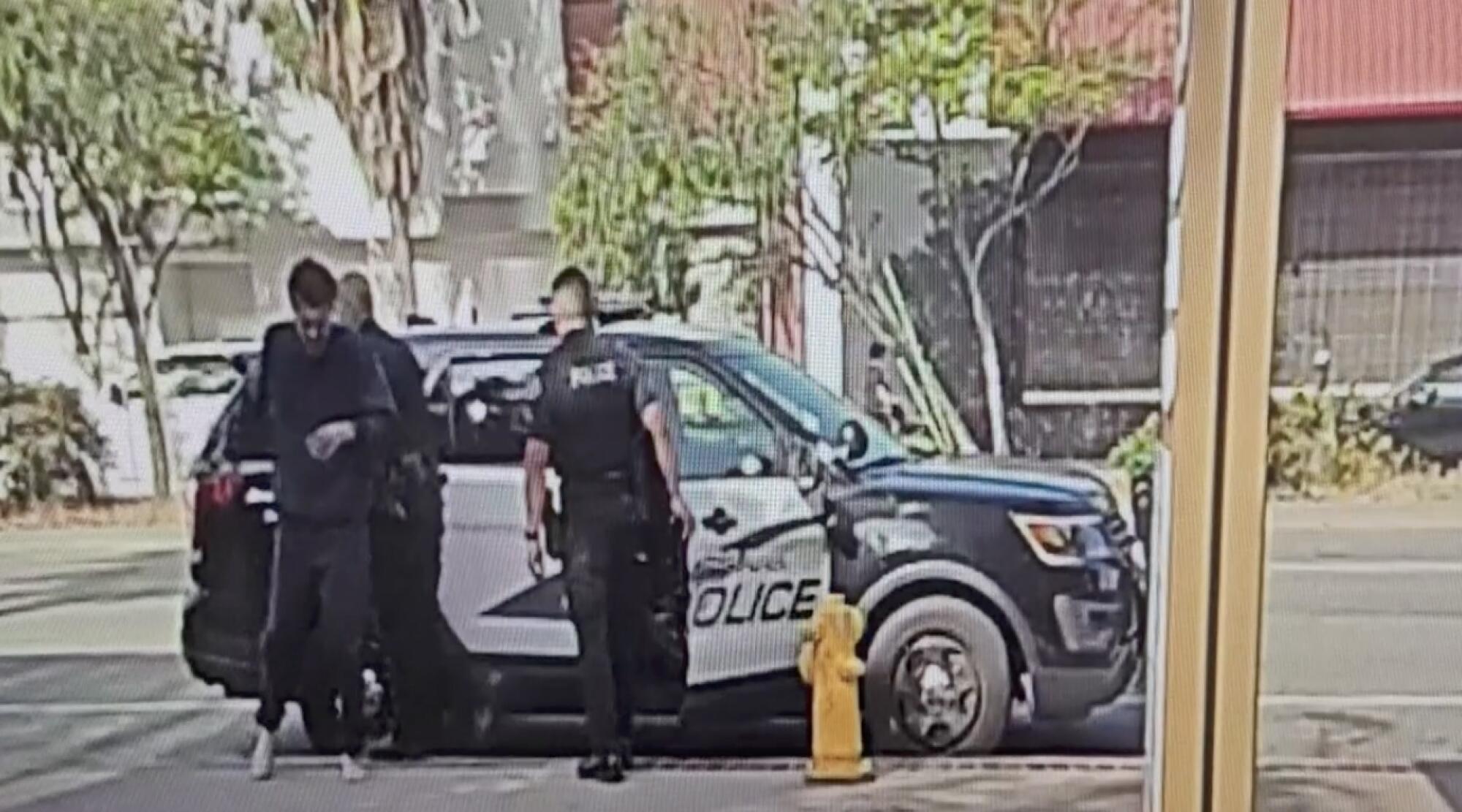
“I’m very, very concerned that exactly what you saw in Burbank could happen more and more,” Mayor Karen Bass said on the day the ruling was issued. “If it’s OK for cities to ticket and to shoo people away, I’ll be very concerned that the numbers of people moved into L.A. from other cities will increase.”
In other parts of the region, some expressed the same fear but in reverse — that L.A. would push its massive homeless population into their communities.
“Most of the people I talk to locally are concerned that LAPD will be chasing their homeless people to their cities,” said Redondo Beach City Atty. Mike Webb, whose city runs an outdoor homeless court that uses misdemeanor prosecution as a pathway to shelter and housing.
Webb said he is hopeful that cities have moved away from harsh enforcement policies in the six years since the 9th U.S. Circuit Court of Appeals ruled that the 8th Amendment’s cruel and unusual punishment clause prohibits criminal penalties for “sitting, sleeping, or lying outside on public property for homeless individuals who cannot obtain shelter.”
A leak purportedly exposed systemic failures of Los Angeles’ anti-camping law, reigniting a debate on the City Council. The reality on the streets is more complex.
Since the Supreme Court’s ruling, Webb said, he has begun speaking with officials from other South Bay cities about establishing a “good neighbor pledge.”
“It would be good to have a good neighbors commitment pledge that they’re not going to try to displace people experiencing homelessness in their area, and instead make people experiencing homelessness aware of the resources available to them,” Webb said.
“I think that’s a fantastic idea,” said Shayla Myers, a Legal Aid Foundation of Los Angeles attorney who has sued L.A. repeatedly over its treatment of its homeless population. “The reality is, criminalizing homelessness does not solve homelessness. It simply pushes people from one place to another.”
Myers said she hopes city attorneys will view the decision narrowly, taking into account protections in other parts of the U.S. Constitution, the California Constitution and the “necessity” defense against prosecution for violation of anti-camping laws.
“The Supreme Court tells us sometimes what jurisdictions can do, but they don’t tell us what jurisdictions should do,” she said. “For a place like Los Angeles, with 89 jurisdictions, it would be disastrous for cities in this county to engage in a race to the bottom.”
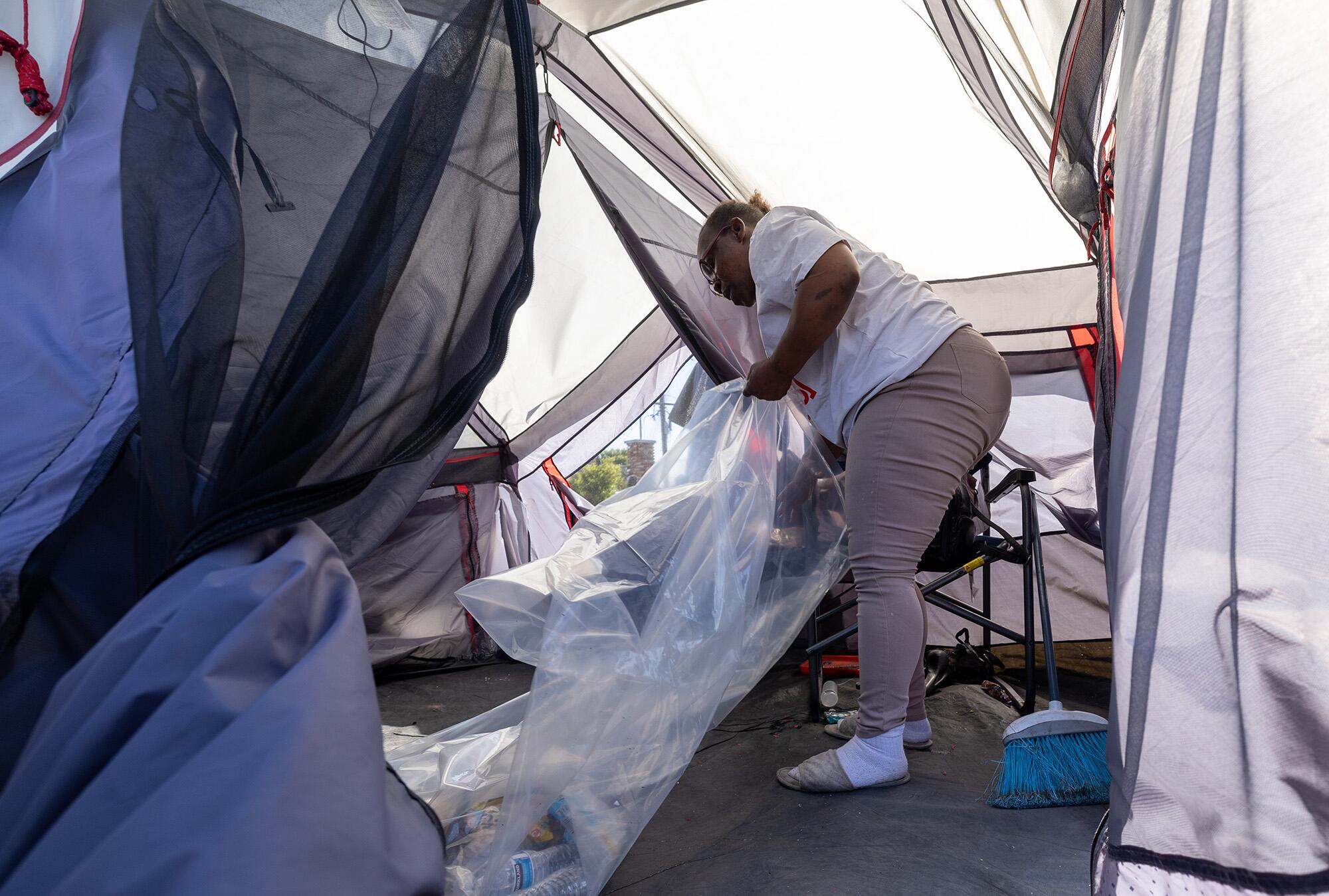
Anti-camping laws have been contested legal terrain since at least 2018, when the 9th Circuit blocked Boise, Idaho, from clearing away encampments on the grounds that it lacked adequate shelter beds for its homeless population.
The Supreme Court declined to review that decision, but this year it took up a similar case focusing on Grants Pass, Ore. In that case, the 9th Circuit had overturned a set of local ordinances that barred homeless people from sleeping in certain public areas when there was an insufficient number of shelter beds.
In a 6-3 decision, the high court reversed the appeals court decision. The ruling clears the way for cities to resume enforcing laws idled by the 9th Circuit or to toughen laws that were watered down in an effort to comply with it.
In Southern California, several city officials contacted by The Times said it was too soon to say how the ruling would affect their policies.
Torrance Mayor George K. Chen said his city would conduct a review of its ordinances in the wake of the Grants Pass decision. Monrovia City Manager Dylan Feik said his city is awaiting a legal advice letter. Santa Monica officials said they will continue implementing a “robust, wide-ranging and innovative strategy for addressing homelessness.”
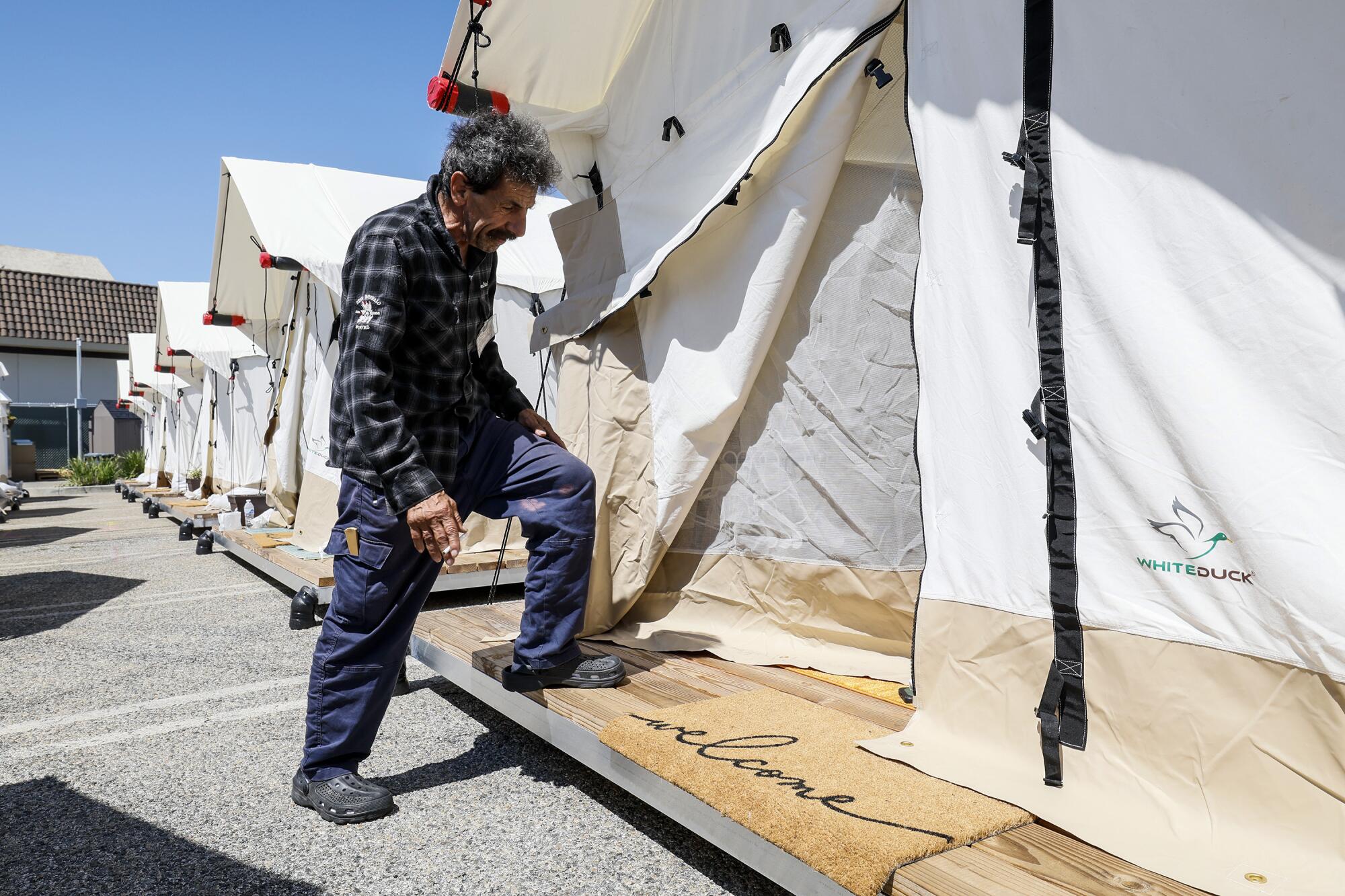
Jeff Kraus, a spokesperson for San Bernardino, said the ruling provided “much-needed clarity.”
“It confirms that cities like San Bernardino have the legal authority to maintain and clean public property and can make that public property available to all residents, not just those who are unhoused.”
The Grants Pass case has carved a deep philosophical divide among California’s politicians, even among Democrats. Gov. Gavin Newsom, San Francisco Mayor London Breed and Los Angeles City Atty. Hydee Feldstein Soto had called for the Supreme Court to take up the issue of anti-camping laws and the 9th Circuit’s ruling in Grants Pass.
On Instagram, Long Beach Mayor Rex Richardson said last month’s decision provided new tools for cities that had been “constrained by legal ambiguities limiting our ability to implement common-sense measures to protect our residents’ well-being.”
Los Angeles County Supervisor Lindsey Horvath offered a scathing response, calling the ruling “unconscionable.”
Bass, appearing with Horvath at an event marking the region’s progress on homelessness, said the decision would “usher in a new wave of criminalization.”
“This is a rehash of the 1990s, when we couldn’t figure out how to deal with a social problem like addiction and gang violence. We just decided we were going to lock everybody up. That’s what I’m far more concerned about, [more] than buses of homeless people being sent to Los Angeles,” she said.
Bass made her remarks on the day that officials reported that the number of unsheltered homeless people — those living in tents, makeshift encampments, cars and other vehicles — had declined by 5.1% in L.A. County and by 10.4% in the city. The mayor used those numbers to argue that punitive approaches are ineffective.
“Giving people tickets and punishing them — how are they supposed to pay for their ticket? And what happens when they don’t pay? Does it go into a warrant and now it gives us an excuse to incarcerate somebody? These are failed responses. We know for a fact that it will not work,” she said.
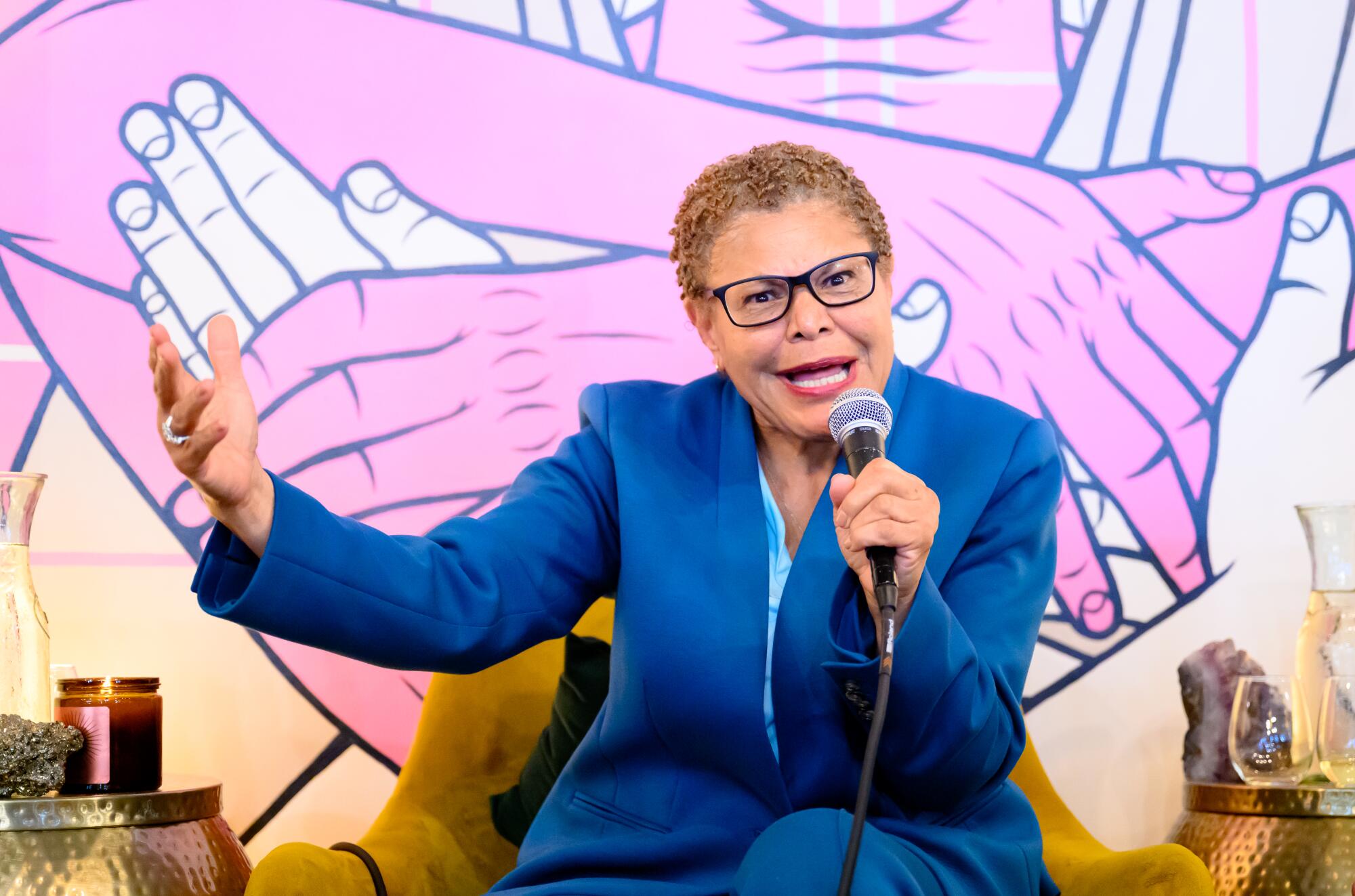
Los Angeles’ anti-encampment law is narrowly focused. Encampments are prohibited within 500 feet of schools and day-care centers. The City Council also can designate “sensitive” areas — libraries, freeway overpasses, homeless shelters and other locations — as off-limits.
Bass has focused much of her energy on her Inside Safe initiative, which has moved more than 2,800 unhoused residents into hotels, motels and other forms of temporary housing. So far, 539 of those have entered permanent housing, according to the Los Angeles Homeless Services Authority.
Los Angeles City Councilmember Traci Park, who teamed up with Bass on Inside Safe operations in Venice, Mar Vista and Del Rey, praised the mayor for securing more interim homeless housing. But she had a sharply different take on Grants Pass, saying the court reached “the legally correct decision.”
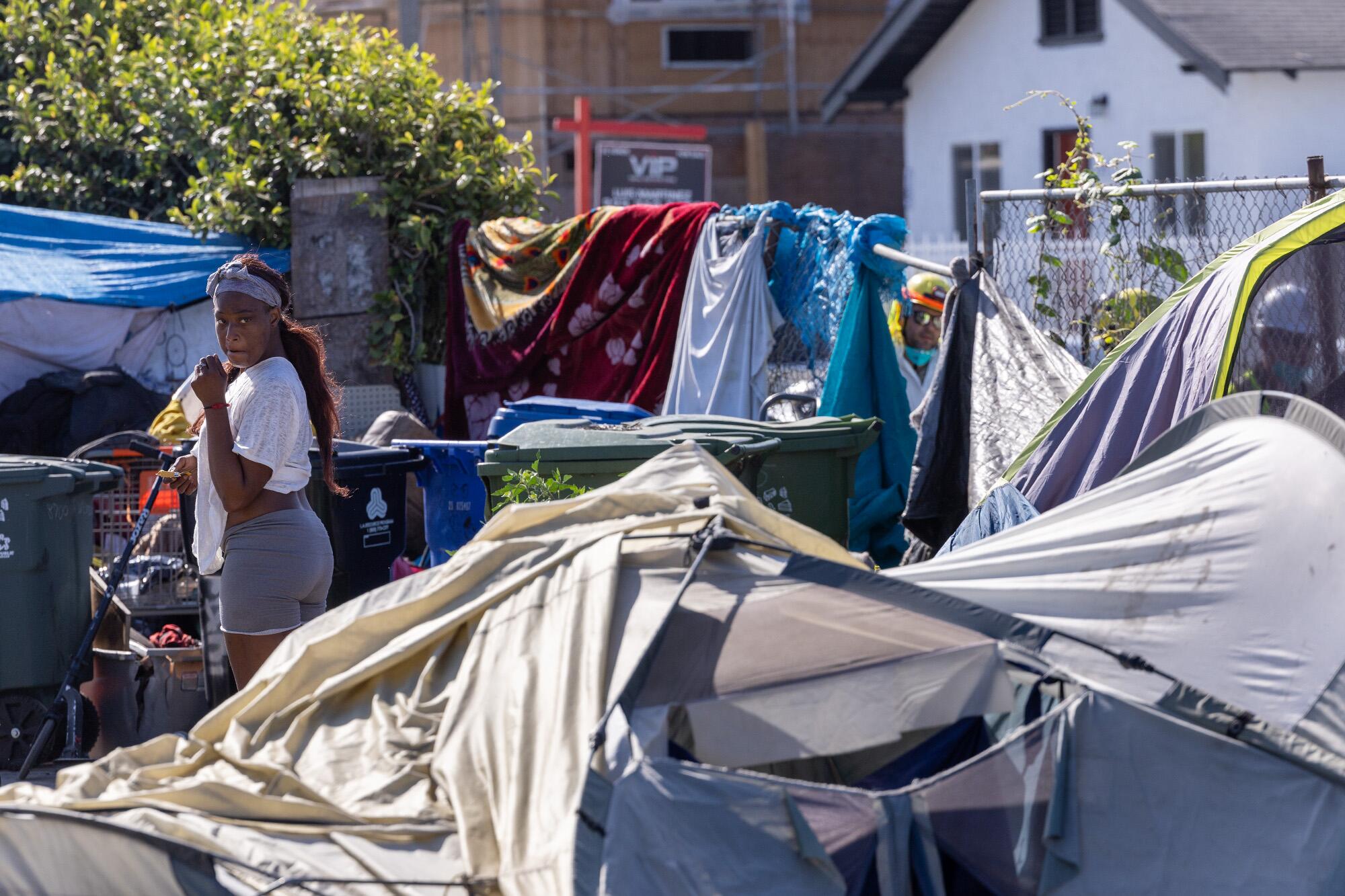
Park said her coastal district had been seeing an influx of homeless people well before the Supreme Court decision, with some moving from other parts of the U.S. The number of new arrivals will increase, she said, if the city fails to enforce its laws on outdoor camping, RV parking and other “quality of life” issues.
“If the city of Los Angeles doesn’t course-correct, we’re going to end up having to absorb what is a regional, statewide and national crisis,” she said.
Seven council members, including Park, have called for the city’s legal team to review outdoor camping laws enacted by Los Angeles County’s 87 other cities. A vote on that review is expected sometime after the council’s summer recess.
Park’s district borders a portion of Culver City, which voted last year to prohibit camping on its sidewalks and other public areas. Nevertheless, Culver City Councilmember Dan O’Brien voiced similar concerns, saying his city lacks the resources to serve every homeless person who arrives from L.A.
O’Brien said Culver City — a community surrounded by L.A. on multiple sides — has worked hard to move its unhoused residents into hotel rooms, a converted motel, its new “Safe Sleep” wellness village and other locations.
“We know where our homeless are from, and provide care and housing, and need L.A. to do the same for theirs,” he said. “Sometimes it’s a challenge with the second part.”
Times staff writer Jasmine Mendez contributed to this report.
More to Read
Sign up for Essential California
The most important California stories and recommendations in your inbox every morning.
You may occasionally receive promotional content from the Los Angeles Times.
